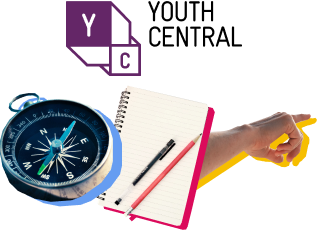There are lots of ways to find a job.
You can search online (that’s easy) but there are many jobs that aren’t even advertised.
So how do you find one that’s right for you?
30%
of Australians work part time
What age can I start working?
Before you start looking for a job, you need to be sure you're legally allowed to work. In Victoria, the minimum working age is 11.
But you’re only allowed to do certain types of work until you turn 15:
- If you’re 11 or 12, you can only do some delivery work such as delivering newspapers (you aren't allowed to deliver pharmaceutical products like medicines).
- If you’re 13 or 14, you can work in retail, a food business or most delivery work (including delivering pharmaceutical products). Examples include working at a fast food restaurant, a supermarket or clothing store.
If you are under 15 and working, there are certain rules you and your employer must follow. For example, your employer has to have a child employment license to be able to employ you and anyone supervising you has to have a Working with Children Check. This is to ensure you are safe.
Once you turn 15, you're legally able to work in Victoria at any kind of job as long as you’re qualified to do it and it doesn't break laws relating to young people, such as being under 18 and serving or selling alcohol.
What type of job do you want?
You might just be looking for a job over the summer (seasonal work). This could be working on a farm picking fruit or working in a tourist town.
You might be looking for something all year round for a few hours after school (casual work). Maybe at a cafe or shop.
What is casual work?
Casual work is a legal definition. It means you have work hours that change every week – usually, no two weeks are the same. Your hours change according to a roster.
In exchange for working flexible hours, casual workers receive extra pay over the normal rates – called 'casual loading.' Casual workers also receive higher penalty rates for working weekends.
Summer jobs and casual jobs are great while you are studying and don’t have lots of time. They are great work experience and give you some extra money.
But what if you have more time for a job and need more money?
That’s when you might look for part-time work (consistent work less than 38 hours per week) or full-time work (consistent work between 38-40 hours a week).
What is part-time work?
Part-time work is a legal term. It means you have regular work hours every week, but you work less than 38 hours per week.
Part-time workers get 'entitlements' like sick leave and annual leave, but they might get less than full-time workers.
An in-person or over-the-phone conversation with an employer can help to give them a good and memorable impression of you.
Search regularly
If you're serious about finding a job, you need to get into the habit of searching regularly.
Set yourself the goal of looking for work at least once a week, if not more often. The more you look, the more there is to find.
There are lots of jobs that aren’t advertised. If you let everyone know you’re looking for a job, you’ll be surprised how many jobs you hear about.
It helped to let people in my community networks know that I was keen to find work.
Consider every job
It’s a good idea to follow up on any job opportunity, even if you’re not that interested to begin with.
Something that sounds boring to start with might end up being quite interesting.
When you are building your work experience, remember you have to start somewhere and it might not always be your dream job.
But each job helps you learn what you like and don’t like. Eventually you’ll get exactly where you want to be.
Consider getting any job experience you can.
Look out for local businesses with hiring signs in your area, then take your resume in or go in and ask about the job.
Visit company websites
If you know a company you'd like to work for, visit their website to see if they have a job vacancies page.
You may even be able to submit an application directly through their website.
Keeping an eye on company websites could mean that you find out about a job vacancy before it's advertised on other job search sites.
Some organisations may only list their job vacancies on their own website.
Use a job search website
Using a job search website to find a job is the quickest and easiest way to search.
They're easy to use – you just type in the name of a job or skill (for example, cashier) as well as area you wish to work – and a list of current job vacancies will show up.
Ideally, you want to search for jobs close to where you live to avoid having to travel long distances to work.
Getting my first job was an important step in me becoming independent. It was such a great feeling to start earning and spending my own money.
Visit recruitment agency websites
Recruitment agencies work on behalf of employers to find and shortlist job applicants and are helpful if you have past employment experience or relevant higher level education for a specific role.
Most recruitment agencies have their own websites that list job vacancies and allow you to set up a profile or search for available jobs.
Some recruitment agencies specialise in particular kinds of jobs such as retail or hospitality (cafes and restaurants).
Knowing which recruiters specialise in areas you're interested in makes it easier to find jobs in that area.
It can be hard and stressful, but don’t give up. The right job could be just around the corner.
Use a government job website
Creating a profile on a government jobs website is another good way to find out about work you might not hear about otherwise.
The Victorian Government's careers.vic.gov.au and the Federal Government's Workforce Australia will list government job vacancies currently available. Workforce Australia also lists non-government jobs.
The Victorian Government also has a graduate program. It offers pathways specifically tailored to meet your area of study if you completed university. They also have great pathways for Aboriginal and Torres Strait Islander people, and people with accessibility needs.
Remember:
- Decide what type of job you want: seasonal, casual, part-time, or full-time
- Check if you’re old enough to do the job you want
- Look for work at least once a week, if not more often
- Consider every job, even if you’re not sure about it
- Let everyone know you’re looking for a job
- There are lots of jobs that aren’t advertised – ask around

Ready to put your skills into practice?
Get comprehensive guidance on getting a job at Youth Central.






